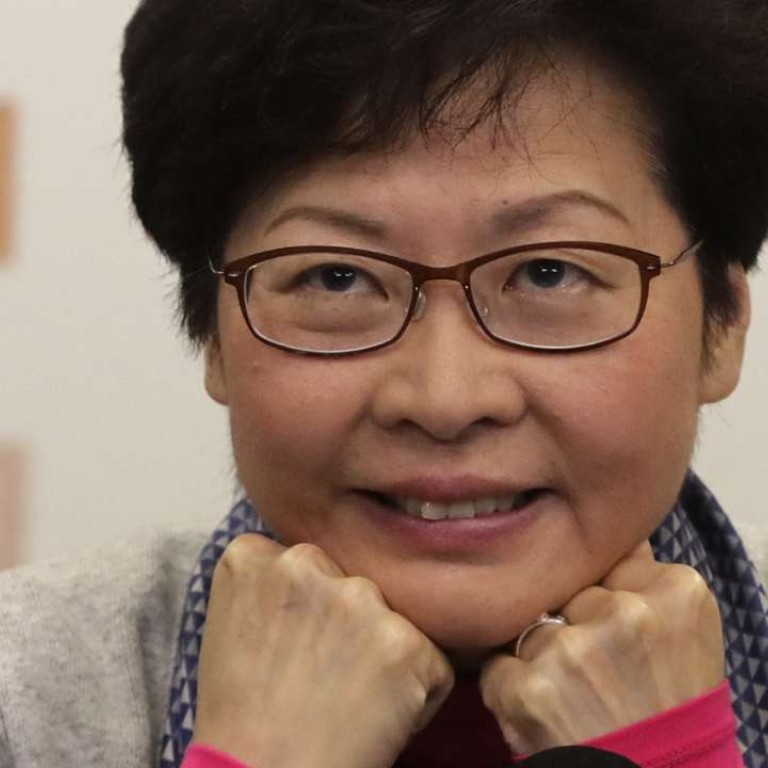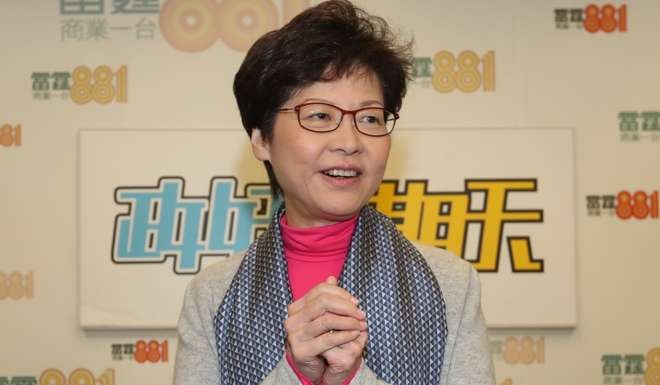
In apparent swipe at John Tsang, Carrie Lam warns against populism in Hong Kong poll
Former chief secretary says she aims to make policy platform public before nominations begin
With the clock ticking for contestants to secure nominations to qualify for Hong Kong’s leadership race, front runner Carrie Lam Cheng Yuet-ngor on Sunday called for a debate with her election rivals on government spending rather than competing on populist pledges.
In a thinly veiled attack on her arch-rival, John Tsang Chun-wah, and his past approach to managing public funds, Lam spoke against hoarding wealth – a day before the former finance minister unveils his campaign platform.

Lam, the former No 2 official widely seen as Beijing’s preferred choice, also hinted that she might scrap a controversial plan to put all primary school students through a new competence assessment exam proposed by the current administration.
Parents and teachers are worried it will require students to undergo more drilling, and all three of Lam’s election rivals have publicly spoken about scrapping it – taking a seemingly populist approach against a widely opposed policy.
Tsang, who was a rank below Lam in government, but enjoys higher popularity even as the underdog in the coming election in March, unveils his platform on his website on Monday morning and will hold a press conference later.
Since launching a crowdfunding bid on Thursday, Tsang has raised more than HK$3.9 million for his campaign.
All four candidates – Tsang, Lam, former security chief Regina Ip Lau Suk-yee and retired judge Woo Kwok-hing – are now focused on lobbying members of the 1,194-strong Election Committee that will pick Hong Kong’s next leader. The remaining week will be critical to secure at least 150 nominating votes a candidate will need by March 1 to qualify. Nominations start on February 14. At least 601 votes are needed to win the election on March 26.

Political analysts believe that with support from the pan-democratic camp, which has more than 300 electors on the committee, Tsang will have enough nominations to qualify. Lam also looks set to garner more than enough nominations, especially after hosting a star-studded rally on Friday featuring tycoons, Beijing loyalists and dozens of electors.
Elaborating on Sunday on her vow to adopt a “new philosophy on public finance”, Lam said: “When we have sound and handsome finances, it’s time to discuss with the people what we should do with it ... If we are only saving the money, I think that may be unfair to society.”
It was a not-so-subtle reference to the fiscal policies of Tsang, who was often accused of being “stingy” and consistently getting his budget forecasts wrong during his 10 years as financial secretary.
In another dig at Tsang, without mentioning his name, Lam also warned against populist election promises over substance.
“It’s inevitable that some sort of populism would be created in any election: ‘I promise you this, get your vote and popular support.’ But I really don’t want this election to be like that,” she said.
All four candidates were knowledgeable about public administration and finances, and should instead debate policies “rationally”, she continued.
She added that while she did not have “direct experience” in education or tax policy, that meant she would not carry any baggage when it came to reviewing them.

